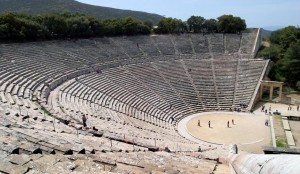Mary Beard has cornered the market in ancient Rome. But the sun may be setting on her empire as the Greece of Plato and Sophocles is about to make a stirring comeback. Having thrilled theatregoers down the ages and formed the basis for modern soap operas, the stories of ancient Greece find themselves centre stage once again.
This summer will see writers from Colm Tóibin to Natalie Haynes put a fresh spin on ancient tragedies, while Greek myths continue to inspire every thing from young adult fiction and children’s literature – the Waterstones children’s book of the month for February is Maz Evans’ riotous Who Let The Gods Out? – to urban fantasies such as Jordanna Max Brodsky’s Olympus Bound series. Even television is set to get in on the act: Troy: Fall of a City, the BBC’s much-anticipated Trojan war drama, starts filming next month and will air in 2018.
“What we’re seeing is that the times we are living in have forced us to acknowledge that there is a darkness in humanity,” says Melissa Cox, editorial director at Hodder & Stoughton, whose Sceptre imprint recently published a short story collection, How Much the Heart Can Hold, in which seven writers including Donal Ryan, Bernadine Evaristo and Nikesh Shukla look at seven Greek definitions of love. “The Greek tragedies, those stories of darkness and obsession and revenge, resonate because we’re living in dark times and these are dark stories. As an editor, if someone came to me with a book inspired by Greek mythology, I’d be very excited.”
Derek Wax, executive producer of Troy: Fall of a City, agrees. “David Farr [the show’s writer] and I went to the site of Troy and it really brought home how these great mythical events illuminate what’s going on at the moment,” he says. “We were standing where eight or nine other cities have stood, near to Gallipoli, the epicentre of other conflicts, and close to where refugees were leaving on boats for Lesbos. It showed us that little has changed since Homer wrote of the devastation of war.”
Just as there are many versions of Greek tragedies and myths, so there are many different ways for an author to recast the tale, in particular by allowing the story’s women to take centre stage. Thus Tóibin’s elegant House of Names takes the fall of the House of Agamemnon, which forms the basis of a number of Greek plays and stories, including Aeschylus’s Oresteia, Euripides’ Orestes and Sophocles’ Electra, and tells it from the point of view of Clytemnestra, grieving mother, adulterous wife, and murderer.
Meanwhile Haynes’ The Children of Jocasta retells the story of Oedipus through the eyes of his wife (and mother) Jocasta and their youngest daughter, Ismene. “I was drawn to Jocasta because she has so few lines in Sophocles’ play, which seems amazing when you consider that her actions drive the story,” she says. “It’s fascinating that the play constantly highlights how clever and quick-witted Oedipus is and how that’s his fatal flaw, but no one ever mentions how smart Jocasta is as well – she is the one who figures out why they’re cursed. She gets there before he does and I thought she would be an interesting way into the tale.”
She picked the lesser-known Ismene over her flashier sister Antigone (herself the subject of a Sophocles play) “because she’s this lovely, overlooked sort of person who is left just as grief-stricken as Antigone, and who suffers the same losses she does – more – by the end of the play. She’s collateral damage. Giving her a voice gave her the chance to shine.”
A similar motivation propels Emily Hauser’s 2016 debut novel For The Most Beautiful, which looks at the Trojan war through the two female slaves, Briseis and Chryseis, whose role as spoils of war kickstarts the action of The Iliad, causing Agamemnon and Achilles to fall out.
“Their role is so central to everything that happens and yet they’re also incredibly marginalised characters,” says Hauser, who studied classics under Beard at Cambridge and is now doing a PhD in the subject at Yale. “I thought it would be really interesting to look at The Iliad from that perspective, because once you start seeing it through the eyes of women, and women who have been captured as slaves at that, it gives the whole story a different tenor and makes us consider what the true cost of war might be.”
Her next novel For The Winner, due out in June, looks at the story of Jason and the Argonauts through Atalanta, the only woman on the journey, who would later famously lose a race after being distracted by golden apples as she ran.
“I’ve always found Atalanta’s story interesting because it seems so obviously told from a male perspective of a woman being easily distracted,” Hauser says. “I started thinking about why she would allow that to happen, and the book is an attempt to explain what her motivation might have been in that final race.”
But is there an audience for these modern takes on ancient tales? Wax says there definitely is. “We were very clear that we didn’t want this series to be a sword-and-sandals epic,” he says. “This is a story about complex family dynamics, about identity, betrayal and belonging. There are huge emotional depths to these stories – many of which are later explored by the writers of the Greek tragedies who reinterpret them as their own – and we felt, why not do the same ourselves? It’s a completely different time, yet one that feels strangely similar. These myths may be 3,000 years old but the story they tell still grips.”
Haynes agrees. “I made a documentary for Radio 4 about the links between Greek tragedy and modern day soap operas. All those stories about generation against generation and brothers at war come directly from Greek tragedy and we’re still drawing on them today,” she says. “I also recently gave a talk at a secondary school about Oedipus and when we got to the climax of the tale there were gasps. That’s not my gift as storyteller – that’s the calibre of the story being told. They resonate because they are so good.”
The Children of Jocasta by Natalie Haynes is published by Mantle on 4 May; The House of Names by Colm Tóibin is published by Viking on 18 May; For The Winner by Emily Hauser is published by Doubleday on 15 June.
Ask me anything
Explore related questions





